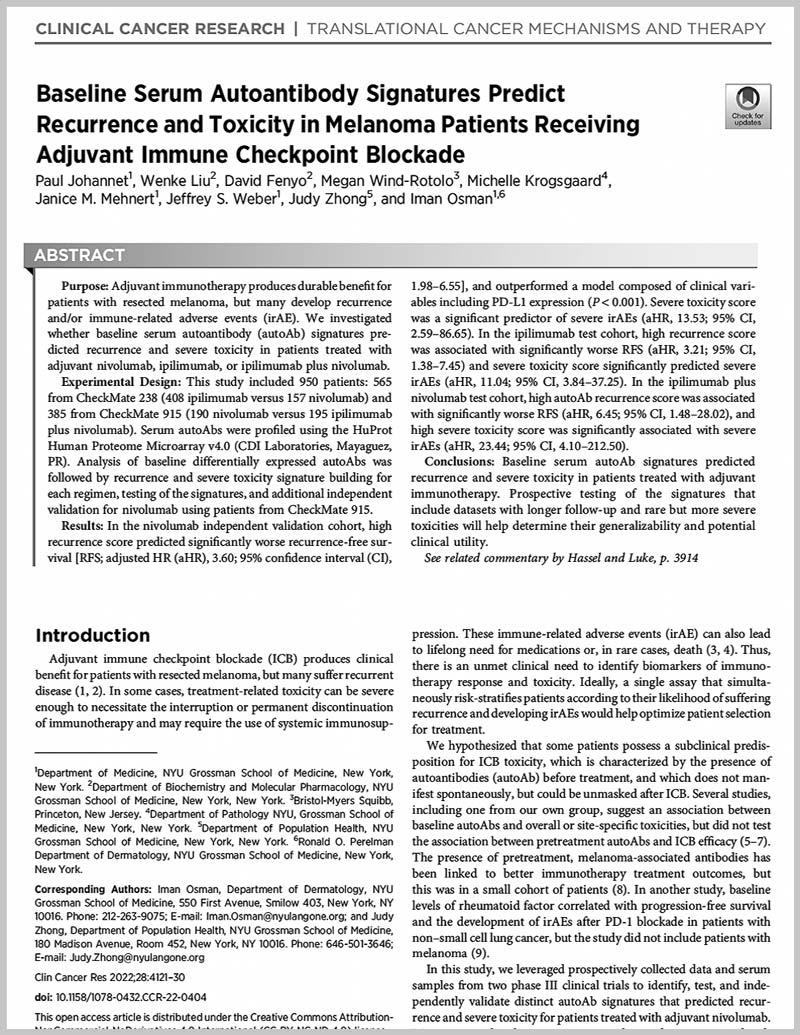- Follow Us
CDI Labs Services for
Oncology
HuProt identifies autoantibody signatures that have the potential to predict disease recurrence.
REQUEST INFOHuProt Helps Predict Disease Recurrence and Immune-related Adverse Events
An invaluable target identification tool which enables discovery of diverse tumor-associated targets at a proteome-wide scale
Cancer research and treatment has been revolutionized with the advent of immune-based cancer therapy, also known as immunotherapy or immuno-oncology (IO). Unlike traditional cancer treatments like chemotherapy and radiation therapy, which aim to directly target cancer cells, immunotherapy works by enhancing or restoring the immune system's ability to detect and attack cancer cells. Checkpoint inhibitors are an example of this approach. These drugs block inhibitory checkpoints on immune cells, such as cytotoxic T-lymphocyte-associated protein 4 (CTLA-4) and programmed cell death protein 1 (PD-1), allowing the immune system to recognize and attack cancer cells more effectively. Drugs like ipilimumab (targeting CTLA-4), pembrolizumab, and nivolumab (targeting PD-1) are examples of checkpoint inhibitors approved for various cancer types.
In the featured publication, HuProt™ microarray was used to identify autoantibody signatures that have the potential to predict both disease recurrence and immune-related adverse events in melanoma patients treated with checkpoint inhibitor adjuvant immunotherapy.
In addition to serum profiling applications, HuProt is an invaluable target identification tool which enables discovery of diverse tumor-associated targets at a proteome-wide scale. Applications include:
- Development and specificity testing of antibody-drug conjugates (ADCs) which represent a cutting-edge fusion of biotechnology and pharmacology. These compounds consist of monoclonal antibodies, which specifically recognize antigens on cancer cells, linked to potent cytotoxic drugs. By precisely delivering cytotoxic agents to cancer cells while sparing healthy tissue, ADCs hold immense therapeutic potential.
- Development of multi-specific medicines which overcome the challenge of “undruggable targets” by using the principle of chemically induced proximity (CIP). CIP, which brings two things together by using small molecules or chemical ligands, is a powerful approach used in chemical biology and drug discovery to modulate protein function through the controlled assembly of protein complexes.
- Identification of small molecule drug targets which can be discovered on HuProt via biotinylation of the small molecule being studied. These types of targeted small molecule therapies aim to interfere with pathways that are crucial for cancer progression, and include kinase inhibitors, hormone receptor blockers, angiogenesis inhibitors and apoptosis inducers.
Baseline Serum Autoantibody Signatures Predict Recurrence and Toxicity in Melanoma Patients Receiving Adjuvant Immune Checkpoint Blockade
Purpose
Adjuvant immunotherapy produces durable benefit for patients with resected melanoma, but many develop recurrence and/or immune-related adverse events (irAE). We investigated whether baseline serum autoantibody (autoAb) signatures predicted recurrence and severe toxicity in patients treated with adjuvant nivolumab, ipilimumab, or ipilimumab plus nivolumab.
VIEW PAPER
